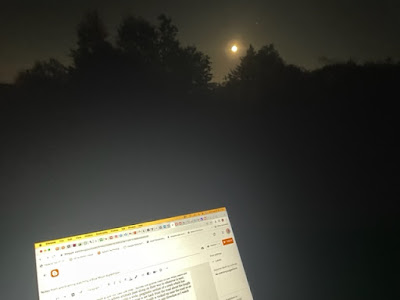 |
| August 30, 2023. A pastel orange supermoon rising. |
On the other side of Rocky Run is a gravel pit where a variety of Northern Minnesota wildlife hang out. We've had wolves, coyotes, deer, bears, and even a cougar now and then passes through our neighborhood. At this moment I'm seated in the darkness out back, listening to the night, watching the moon while typing up my impressions and observations.
About fifteen minutes ago there were coyotes chattering down below in the gravel pit. They did their little sequence of yips, then listened. A minute later the alpha male gave a call which sounded a little nearer, over my right shoulder. No more sounds from the coyotes afterwards.
Other sounds tonight include cars and trucks scrolling down Highway 2, Maple Grove and the Midway Road; the buzzing of mosquitos; the chirping of crickets (unless that's my tinnitus, which it may well be); and very little else.
The moon glows. It's not blue. Rather, as it broke above the horizon it was a pale orange. Several cars pass. Near silence again.
They say that God speaks in a still, small voice. What a contrast to the contemporary sensory assault we get through the media. Talking heads, sound bytes, high volume hyper messaging, Tik Tok mania, animated podcasters and amped politicos.... all dedicated to keeping us jazzed, stimulated, distracted, delirious, juiced, provoked and fired up, all in the name of keeping us "informed."
 |
| Laptop on my lap, typing my observations in real time. |
Truly silent now. One car way off in the distance. Nothing passing on the highway. And now that car has passed as well.
In the shrubs to my right I hear the sound of an animal of some kind, a scratching sound, quiet but noticeable.
More silence.
Throughout this time the stars have been emerging. A jet plane way up in the stratosphere is silently gliding by, red and white lights flashing.
Time passes. Now there is the call of what sounds like a goose in the distance to my back. The bird makes a half dozen calls, then waits. After a minute lapses, there is a call from the North, somewhere in the cattle pasture. A truck passes and temporarily drowns the plaintive calls that soon re-commence.
Another plane quietly passes overhead... and the lonesome goose continues his or her melancholic wistful call.
This supermoon, purportedly 17% larger than normal due to its proximity to earth, looks like most of the moons I've seen over the years. The universe is so vast of a backdrop that this 17% is hardly noticeable except when it first breaks the horizon. Or so it seems.
Were you watching the night sky last night? Where? And what did you see?












